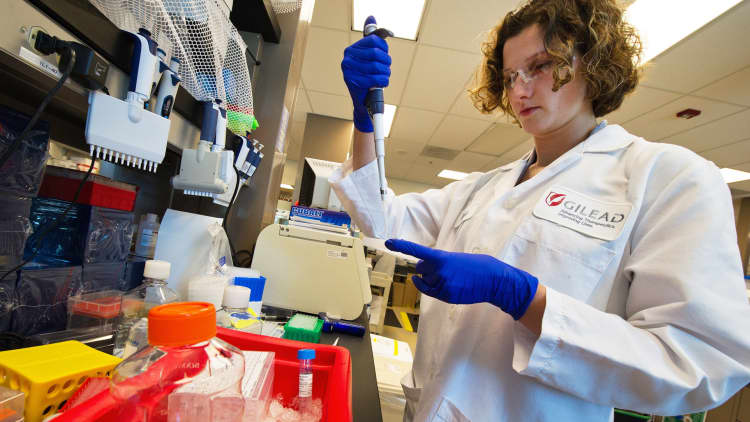
Gilead Sciences shares fell 4% Monday after it released results from a phase 3 trial that showed its antiviral drug remdesivir helped some moderately sick coronavirus patients.
The trial compared patients on either a five-day or 10-day course of remdesivir plus standard care versus standard care alone. The patients had a "moderate" form of Covid-19, meaning they were hospitalized but did not require a ventilator. Patients on a five-day course were 65% more likely to have clinical improvement at day 11 versus standard of care, according to Gilead.
The odds of improvement in clinical status with the 10-day treatment course of remdesivir versus standard of care were also favorable, but not statistically significant, the company said.
Although the data suggest a modest benefit against the coronavirus, skepticism is likely to grow about how effective is it.
"We now have three randomized, controlled clinical trials demonstrating that remdesivir improved clinical outcomes by several different measures," Gilead Chief Medical Officer Dr. Merdad Parsey said in a statement. "Today's results showed that when treating moderate disease, a 5-day course of remdesivir led to greater clinical improvement than standard of care, adding further evidence of remdesivir's benefit to previously released study results."
Remdesivir was generally well tolerated across either treatment group, the company said.
In late April, the National Institute of Allergy and Infectious Diseases released preliminary results from its own study showing Covid-19 patients who took remdesivir usually recovered after 11 days, four days faster than those who didn't take the drug.
The results led the Food and Drug Administration to grant emergency use authorization for the drug on May 1. The designation allowed remdesivir to no undergo the same level of review as an FDA-approved treatment. However, doctors will be allowed to use the drug on patients hospitalized with the disease.
There are no formally approved treatments for the coronavirus, which has infected more than 6.1 million people worldwide, according to Johns Hopkins University data.
Remdesivir has shown some promise in treating SARS and MERS, which are also caused by coronaviruses. Some health authorities in the U.S., China and other parts of the world have been using remdesivir, which was tested as a possible treatment for the Ebola outbreak, in hopes that the drug can improve the outcomes for Covid-19 patients.


